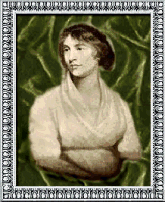

Mary Wollstonecraft’s A Vindication of the Rights of Women has been called her most important work and in it Mary argued against the forces which kept women ignorant and the superficiality and shallowness they were encouraged to engage in. Mary’s own letters reflect her own personal interests that were in contrast to such superficial interests.
For instance, in a letter to George Blood in 1789 she writes, "Blessed be that Power who gave me an active mind! If it does not smooth, it enables me to jump over the rough places in life. Indeed, Mary goes on to describe marriage as "legal prostitution" in this work, and asserted other such controversial views that fellow radicals were bewildered. Essentially, in Vindication Mary was arguing for equal rights for both men and women.
How does her personal activity of the time support her independent thinking? Quite simply, it is her constant exercise of a love of knowledge and an ability to think originally that lended themselves to Mary’s political and philosophical views. In the following quotes we find a preoccupation with independence and a desire to learn, and also a willingness to help fellow man.
"Indepedence I have long considered as the grand blessing of life, the basis of every virtue - and independence I will ever secure by contracting my wants, thought I were to live on a barren heath. [Mary Wollstonecraft, Rights of Woman, 1792 ]
"...I am not born to tread in the beaten track - the peculiar bent of my nature pushes me on" [Letter to Everina: London 1787]
"...I am not a fair-weather friend - on the contrary, I think, I love most people best when they are in adversity - for pity is one of my prevailing passions." [Mary Wollstonecraft, Letter to George Blood: Newington Green, July 1785]

